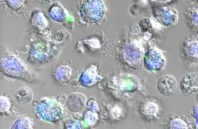Recognizing that the way nanoparticles interact with the immune system remains unclear and unpredictable, restricting their potential use in medicine, researchers from the University of Geneva (UNIGE) and the University of Fribourg (UNIFR; both in Switzerland) used a flow cytometry method to select the most promising nanoparticles, thereby tracking the development of future treatments quickly. In less than a week, the researchers were able to determine whether nanoparticles are compatible or not with the human body – an analysis that previously required several months of work. This discovery could lead to rapid, safe, and less expensive development of nanotechnology applied to medicine.
Flow Cytometry Quickly Screens For The Most Useful Nanoparticles For Medicine


 (585) 768-2513
(585) 768-2513
